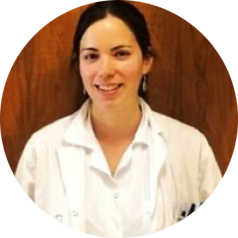Rocío Olivera Salazar
Julio Rodríguez Villanueva Award for Best Doctoral Thesis


March 25, 2024
After graduating in Biology (UAM), she completed a Master's in Biomedical Research (UCM) and obtained her doctoral degree at UAM within the Medicine and Surgery PhD program. Currently, she works as a Postdoctoral Researcher in the New Therapies Laboratory at the IIS-FJD, where she has developed a protocol to analyze the hypermethylation of the SEPT9 gene through liquid biopsy in plasma from patients with digestive tumors. This finding is helping in diagnosis and detecting possible recurrences in the digestive surgery service at the Jiménez Díaz Hospital. To date, she has published several indexed scientific articles and participated in various international conferences on colorectal cancer, while also collaborating on multiple research projects.
Project Summary and Clinical Relevance
Title: The oval cell as responsible for hepatic metastasis in colorectal cancer
Hepatic metastasis from colorectal cancer is the leading cause of death for this type of tumor, and various approaches are required for the development of new therapies against metastatic disease. In this regard, malignant transformation of cells susceptible to incorporating circulating DNA from the primary tumor (genomastasis) has been demonstrated. The most frequently described mutation in colorectal cancer is KRASG12D, and malignant transformation has been demonstrated through horizontal transfer of this mutation in mouse fibroblasts, but not in liver cells. Several studies indicate that the hepatic progenitor cell (oval cell in mice) is the perfect candidate for malignant transformation, as it is known to be involved in the development of liver tumors. The objective of this doctoral thesis was to determine if oval cells (OCs) are susceptible to malignant transformation through horizontal transfer of the KrasG12D oncogene and under which conditions this susceptibility is favored. Three lines of OCs were used in different conditions, co-cultured without contact (transwell) with murine colon cancer cells (CT26.WT) containing the test mutation. The results showed that OCs are susceptible to malignant transformation through horizontal transfer of the KrasG12D mutation released by CT26.WT cells. Moreover, the OCs-1 cell line was the most susceptible, presenting a more undifferentiated cell profile and culture conditions similar to the hepatic microenvironment. Thus, the results of this doctoral thesis contribute to a better understanding of the metastatic process in colorectal cancer and how certain liver cells may contribute to the development of secondary tumors.



